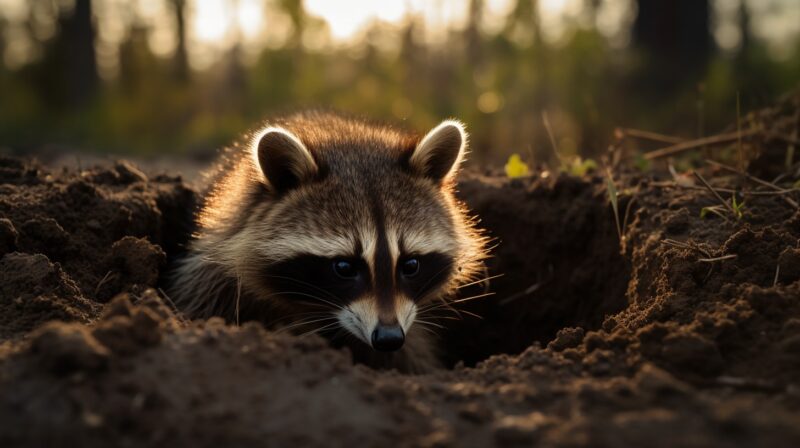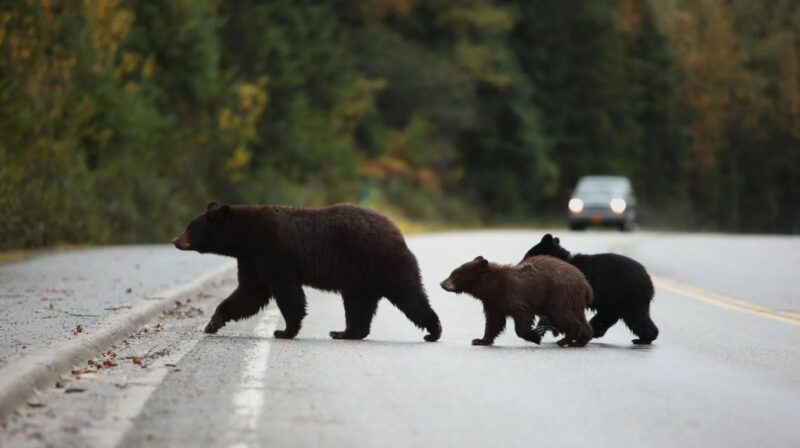Discovering that raccoons have turned your beautifully maintained lawn into their personal playground overnight can be a frustrating experience.
Raccoons, those clever nocturnal creatures, often dig up lawns in search of white grubs, a favorite snack.
Fortunately, there are effective strategies to keep your lawn raccoon-free without resorting to harsh chemicals or dangerous deterrents, and I will present you with them today.
Key Highlights
- Eliminate grubs from your lawn to remove the primary food source attracting raccoons.
- Use physical barriers like protective netting and fencing to prevent raccoon access.
- Regular lawn maintenance and healthy gardening practices deter grubs and raccoons.
- Avoid ineffective and potentially harmful deterrents such as electrical fencing and chili powders.
- Consult professional pest management services for persistent raccoon problems.
Why Do Raccoons Dig Up Lawns?
Similar to the ones in forests, urban raccoons dig up lawns primarily to find and feast on white grubs lurking beneath the surface.
These grubs, the larvae of beetles, are a nutrient-rich food source for raccoons.
Your lawn becomes an attractive target if it’s rich in these pests.
How Can You Stop Raccoons From Digging Up Your Lawn?

The key to preventing raccoons from turning your lawn into a buffet lies in addressing the root cause: the grub infestation.
Simultaneously, employing effective exclusion tactics and consulting professional pest management can offer a comprehensive solution.
- Getting Rid of White Grubs: Annual grub treatments in spring, summer, and fall significantly reduce the grub population in your lawn. Products like predatory nematodes or milky spores are effective natural solutions. Predatory nematodes are microscopic worms that naturally kill grubs, while milky spore is a natural bacterium that targets and eliminates them.
- Excluding Raccoons with Fencing: Physical barriers can effectively keep raccoons at bay. Laying down fencing, such as chicken wire or protective netting, directly on your lawn can deter raccoons from attempting to dig. Secure the edges with landscape clips to ensure raccoons cannot easily lift the netting.
- Professional Pest Management: For persistent raccoon problems, consulting a professional pest management service can provide tailored solutions. Experts can assess your specific situation and recommend strategies beyond the reach of typical homeowners.
What Should You Not Do?
Avoid unproven methods such as electrical fencing, chili flakes, powders, and soaking the soil in pyrethroid insecticides.
Not only are these methods ineffective, but they can also harm the ecosystem of your garden.
Safety Precautions
When applying any treatment, always read labels carefully and wear personal protective equipment (PPE).
Direct handling or trapping of raccoons is not recommended due to safety concerns.
Natural Repellents
Natural repellents, including deterrent sprays and ultrasonic repellents, may offer a temporary fix.
However, they break down quickly and require frequent reapplication to maintain their effectiveness.
How To Ensure Long-Term Success?
Annual grub treatments are crucial for the long-term prevention of raccoon digging.
Maintaining a healthy lawn free of grubs means raccoons will look elsewhere for food.
Maintaining a Raccoon-Free Lawn

Achieving and maintaining a raccoon-free lawn requires vigilance and a multi-layered approach.
Knowing the habits and preferences of raccoons can guide you in taking proactive measures to protect your outdoor space.
1. Cultivating a Healthy Lawn
A healthy, robust lawn is your first line of defense against raccoons. Strong grass roots and a well-maintained yard are less inviting to grubs and, consequently, raccoons.
Regular lawn care practices, such as aeration, proper mowing, and watering, create an environment that is less attractive to pests.
2. Secure Trash and Compost
Raccoons are opportunistic feeders that will take advantage of easy food sources.
Securing trash cans with tight-fitting lids and ensuring compost bins are not accessible can reduce the attraction of your yard to raccoons looking for food.
3. Use Motion-Activated Sprinklers
Motion-activated sprinklers can startle and deter raccoons without causing them harm.
These devices activate when they detect movement, spraying water in the direction of the intruder.
The sudden noise and water can discourage raccoons from entering your yard.
4. Reduce Shelter Opportunities
Raccoons look for shelter in brush piles, hollow trees, and under decks. By reducing potential shelter opportunities, you make your yard less appealing.
Keep the area around your home clear of debris, and consider enclosing spaces under porches or decks.
What About Food Gardens?

If you have a vegetable garden or fruit trees, these can be a significant draw for raccoons. Using bird netting or building a secure fence around your garden can protect your produce.
Remember, raccoons are excellent climbers, so a covered enclosure might be necessary for determined visitors.
Monitoring and Adaptation
Regularly inspect your lawn and property for signs of raccoon activity. Early detection of digging or other damage can help you respond quickly and adjust your prevention strategies as needed.
Keep in mind that what works one season may need tweaking the next, as raccoons are adaptable and might overcome previous deterrents.
FAQ
Can I Use Ultrasonic Repellents to Keep Raccoons Away?
Ultrasonic repellents may deter them temporarily, but they are not a reliable long-term solution. Raccoons can become accustomed to the sound over time.
Will Chili Flakes or Powders Stop Raccoons?
Chili flakes and powders are not recommended. Raccoons may initially be deterred, but these substances can easily wash away or lose their potency, requiring frequent reapplication.
Is It Safe To Trap Raccoons Myself?
Trapping them is not recommended due to safety concerns and legal restrictions in many areas. If you believe trapping is necessary, contact a professional pest management service.
Can lighting deter raccoons from my yard?
Yes, strategic lighting, especially motion-activated lights, can deter them by making them feel exposed and vulnerable.
Do raccoons have a digging season?
They are more active in spring and fall when their food sources, like grubs, are closer to the surface of your lawn.
Are raccoons dangerous to pets?
They can be dangerous if cornered or threatened, potentially harming pets. It’s best to keep pets away if a raccoon is spotted.
Can I plant certain types of grass to deter grubs and raccoons?
While no specific grass type deters grubs and raccoons, maintaining a healthy lawn can reduce grub appeal, indirectly deterring raccoons.
How quickly do natural repellents need to be reapplied?
Natural repellents generally need reapplication every few days or after significant rainfall.
Will watering my lawn more frequently deter raccoons?
Excessive watering can attract more grubs, potentially leading to increased raccoon activity. Moderate watering is recommended.
Final Words
The best strategy to prevent raccoons from digging up your lawn involves a combination of eliminating their food source (white grubs), employing physical deterrents like protective netting, and seeking help from pest management professionals.
With patience and persistence, you can maintain a raccoon-free lawn that thrives throughout the year.
Related Posts:
- Can Swimming Pools Be Eco-Friendly? Exploring…
- Where to Find Raccoons in the Forest? Wildlife Encounters
- What Sounds Do Raccoons Make? - Meaning and How to…
- How Good Are Raccoons Senses? The Mammals Toolkit!
- What Do Raccoons Eat? - How Their Diets Overlap and Differ
- Why Do Moths Eat Your Clothes? - Wardrobe Woes








